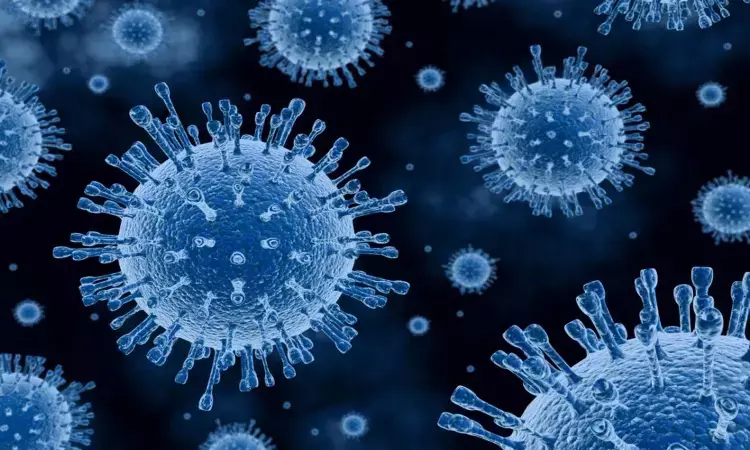- Home
- Medical news & Guidelines
- Anesthesiology
- Cardiology and CTVS
- Critical Care
- Dentistry
- Dermatology
- Diabetes and Endocrinology
- ENT
- Gastroenterology
- Medicine
- Nephrology
- Neurology
- Obstretics-Gynaecology
- Oncology
- Ophthalmology
- Orthopaedics
- Pediatrics-Neonatology
- Psychiatry
- Pulmonology
- Radiology
- Surgery
- Urology
- Laboratory Medicine
- Diet
- Nursing
- Paramedical
- Physiotherapy
- Health news
- Fact Check
- Bone Health Fact Check
- Brain Health Fact Check
- Cancer Related Fact Check
- Child Care Fact Check
- Dental and oral health fact check
- Diabetes and metabolic health fact check
- Diet and Nutrition Fact Check
- Eye and ENT Care Fact Check
- Fitness fact check
- Gut health fact check
- Heart health fact check
- Kidney health fact check
- Medical education fact check
- Men's health fact check
- Respiratory fact check
- Skin and hair care fact check
- Vaccine and Immunization fact check
- Women's health fact check
- AYUSH
- State News
- Andaman and Nicobar Islands
- Andhra Pradesh
- Arunachal Pradesh
- Assam
- Bihar
- Chandigarh
- Chattisgarh
- Dadra and Nagar Haveli
- Daman and Diu
- Delhi
- Goa
- Gujarat
- Haryana
- Himachal Pradesh
- Jammu & Kashmir
- Jharkhand
- Karnataka
- Kerala
- Ladakh
- Lakshadweep
- Madhya Pradesh
- Maharashtra
- Manipur
- Meghalaya
- Mizoram
- Nagaland
- Odisha
- Puducherry
- Punjab
- Rajasthan
- Sikkim
- Tamil Nadu
- Telangana
- Tripura
- Uttar Pradesh
- Uttrakhand
- West Bengal
- Medical Education
- Industry
Carprofen and Celecoxib may inhibit replication of COVID-19 virus

Carprofen and Celecoxib have been selected by the COVID Moonshot initiative for in vitro testing as they may inhibit replication of COVID-19 virus.
The scientific community has been working on developing an effective treatment for the virus responsible for the disease since the outbreak of the COVID-19 pandemic.
The URV's Cheminformatics and Nutrition research group has carried out a computational screening to predict whether there is a medicine authorised for treating another pathology that can inhibit the main protease of the virus (M-pro). This is key to the whole process because this enzyme plays an essential role in the replication of the virus.
The study demonstrates that a human and a veterinary anti-inflammatory drug - Carprofen and Celecoxib - inhibit a key enzyme in the replication and transcription of the virus responsible for COVID-19. The aim of the study was to use computer techniques to analyze whether 6,466 drugs authorized by various drug agencies for both human and veterinary use could be used to inhibit the M-pro enzyme. This enzyme is a protease that is responsible for cutting two polypeptides (generated by the virus itself) and generating a number of proteins that are essential for the reproduction of the virus. Some of the trials coordinated by the WHO against the COVID-19 pandemic also aim to inhibit M-pro using two antiretrovirals such as Lopinavir and Ritonavir (drugs initially designed to treat HIV).
As a result of the study conducted at the URV, it has been predicted that 7 of these 6,466 drugs may inhibit M-pro. The results have been shared with the international initiative COVID Moonshot which has selected 2 of these 7 compounds (i.e., Carprofen and Celecoxib) in order to test their ability to inhibit M-pro in vitro. The results obtained show that at a concentration of 50 μM of Celecoxib or Carprofen, the inhibition of the in vitro activity of M-pro is 11.90 and 4.0%, respectively. Therefore, both molecules could be used as a starting point for further lead optimization to obtain even more potent derivatives.
The study by the Cheminformatics and Nutrition research group from the Biochemistry and Biotechnology Department of the URV has been led by Drs. Gerard Pujadas and Santi Garcia-Vallvé with the collaboration of Drs. Aleix Gimeno, María José Ojeda-Montes and Adrià Cereto-Massagué, the PhD students Guillem Macip and Bryan Saldivar-Espinoza and student Júlia Mestres-Truyol (double degree student in Biotechnology and in Biochemistry and Molecular Biology at the URV).
It has been published by the International Journal of Molecular Sciences (IJMS) and is the first to be published worldwide on drug repositioning as inhibitors of SARS-CoV-2 M-pro where computational predictions are experimentally corroborated. The remaining 5 molecules are expected to be selected soon by COVID Moonshot so that their bioactivity can be tested as well.
For more details click on the link: http://dx.doi.org/10.3390/ijms21113793
Hina Zahid Joined Medical Dialogue in 2017 with a passion to work as a Reporter. She coordinates with various national and international journals and association and covers all the stories related to Medical guidelines, Medical Journals, rare medical surgeries as well as all the updates in the medical field. Email: editorial@medicaldialogues.in. Contact no. 011-43720751
Dr Kamal Kant Kohli-MBBS, DTCD- a chest specialist with more than 30 years of practice and a flair for writing clinical articles, Dr Kamal Kant Kohli joined Medical Dialogues as a Chief Editor of Medical News. Besides writing articles, as an editor, he proofreads and verifies all the medical content published on Medical Dialogues including those coming from journals, studies,medical conferences,guidelines etc. Email: drkohli@medicaldialogues.in. Contact no. 011-43720751


